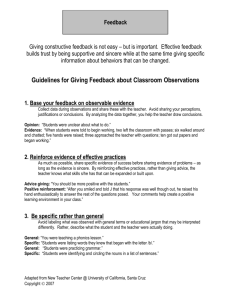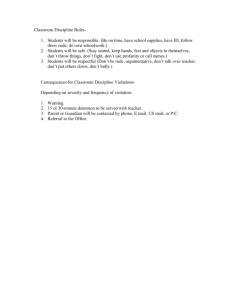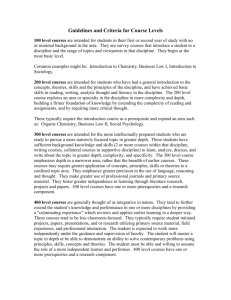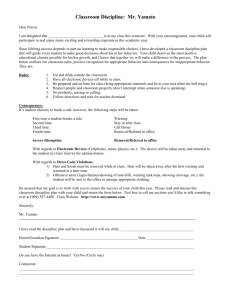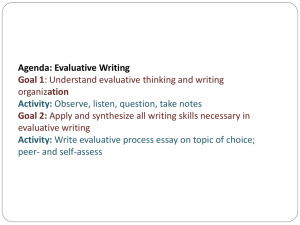Test Taking Vocabulary
advertisement
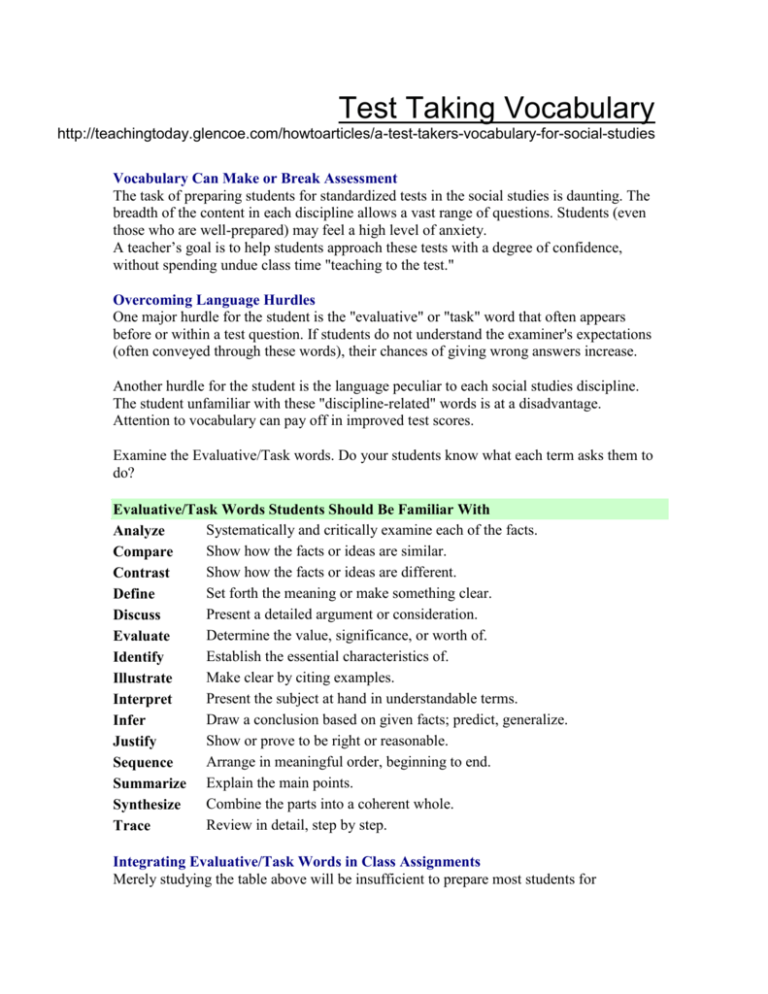
Test Taking Vocabulary http://teachingtoday.glencoe.com/howtoarticles/a-test-takers-vocabulary-for-social-studies Vocabulary Can Make or Break Assessment The task of preparing students for standardized tests in the social studies is daunting. The breadth of the content in each discipline allows a vast range of questions. Students (even those who are well-prepared) may feel a high level of anxiety. A teacher’s goal is to help students approach these tests with a degree of confidence, without spending undue class time "teaching to the test." Overcoming Language Hurdles One major hurdle for the student is the "evaluative" or "task" word that often appears before or within a test question. If students do not understand the examiner's expectations (often conveyed through these words), their chances of giving wrong answers increase. Another hurdle for the student is the language peculiar to each social studies discipline. The student unfamiliar with these "discipline-related" words is at a disadvantage. Attention to vocabulary can pay off in improved test scores. Examine the Evaluative/Task words. Do your students know what each term asks them to do? Evaluative/Task Words Students Should Be Familiar With Systematically and critically examine each of the facts. Analyze Show how the facts or ideas are similar. Compare Show how the facts or ideas are different. Contrast Set forth the meaning or make something clear. Define Present a detailed argument or consideration. Discuss Determine the value, significance, or worth of. Evaluate Establish the essential characteristics of. Identify Make clear by citing examples. Illustrate Present the subject at hand in understandable terms. Interpret Draw a conclusion based on given facts; predict, generalize. Infer Show or prove to be right or reasonable. Justify Arrange in meaningful order, beginning to end. Sequence Summarize Explain the main points. Combine the parts into a coherent whole. Synthesize Review in detail, step by step. Trace Integrating Evaluative/Task Words in Class Assignments Merely studying the table above will be insufficient to prepare most students for understanding the terms on standardized tests. Have students practice addressing questions that use these terms frequently in various forms of evaluation. Redirect those students who are having difficulty. Discipline-Related Words with Meanings Peculiar to Social Studies Social studies textbooks customarily present vocabulary words and exercises as a standard feature in every chapter or section. These are technical vocabulary, such as "grand jury" or "iron curtain," used primarily in the discipline. Other terms may be common to the general vocabulary but have a more specific meaning inside the discipline. Teachers usually incorporate textbook vocabulary terms in lessons. However, we may assume that words people use frequently are familiar to most students. This view takes too much for granted. The following terms are ones students might be expected to know, but that would be unfamiliar in a social studies context to many: Discipline-Specific Words Students Should Know abdicate factors of production adaptation federal alien free enterprise alliance fundamentalism amendment genocide amnesty guerilla belligerent humanism bias icon buffer state imperialism bullion individualism bureaucracy indulgence chivalry inflation classical inherent coalition innovation collectivism institution commune jurisdiction compensation landmark case constituent latitude consumption mandate contemporary mass culture culture media data mortality delegate native demographic nativism desertification nuclear family diffusion nullify dissident override domestic partisan emigration petition pragmatist primary source quartered quota ratify ratio reactionary realism rebate reform republic resolution revenue safety valve sanctions schism sector sovereignty standard of living subsistence suffrage supremacy topographic trust unalienable urbanization ultimatum venue welfare state economic system ensuing political map population density zoning Learning Vocabulary Words Teachers use various methods to teach vocabulary. Regardless of the method, the key to learning the terms is reinforcement. Here are some suggestions for teaching and reinforcing social studies vocabulary words: Traditional Write the definition or use the word in a sentence. Find the word in the text; read it in context; explain its meaning. Complete a crossword puzzle using several vocabulary words. Match the word to its definition in matching sets. Practice with 3" by 5" cards: the word on one side, the definition on the other. Creative Play a word-game version of charades in which students try to guess a word being acted out silently by another. Choose a Word (or Words) of the Day and use the word at different times in class: lecture, discussion, question/answer, written assignment, and so on. Play a "dictionary game" by having one person read the word to the class; letting each student write what they think is the definition; collecting and reading 5-10 definitions at random, one being correct; having the class vote on each to determine whose definition was correct. Understanding the vocabulary is not the same as mastering the content of a discipline, but is does give the student a head start on learning. It may also be an effective way to help them leap forward on a standardized/high stakes test.




